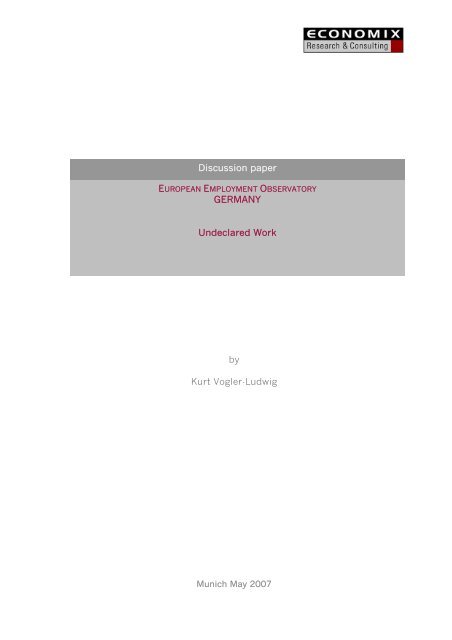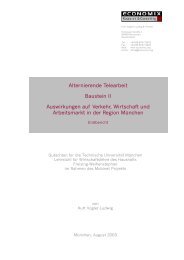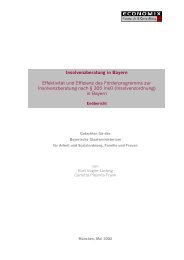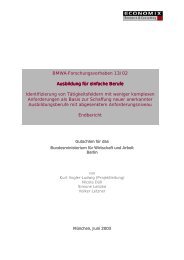Undeclared Work - Economix Research & Consulting
Undeclared Work - Economix Research & Consulting
Undeclared Work - Economix Research & Consulting
Create successful ePaper yourself
Turn your PDF publications into a flip-book with our unique Google optimized e-Paper software.
Discussion paper<br />
EUROPEAN EMPLOYMENT OBSERVATORY<br />
GERMANY<br />
<strong>Undeclared</strong> <strong>Work</strong><br />
by<br />
Kurt Vogler-Ludwig<br />
Munich May 2007
Contents<br />
1. Introduction.........................................................................................................................................3<br />
2. Prevalence of undeclared work in the economy......................................................................................3<br />
Macro-estimates.......................................................................................................................................3<br />
Survey-based estimates............................................................................................................................4<br />
<strong>Undeclared</strong> work in view of the population ...............................................................................................4<br />
The economic interpretation of the shadow economy ...............................................................................5<br />
Illegal employment...................................................................................................................................5<br />
3. Measures taken to combat undeclared work ..........................................................................................6<br />
The 2004 act to combat undeclared work and tax fraud...........................................................................6<br />
Alliances against undeclared work............................................................................................................6<br />
4. Conclusions.........................................................................................................................................7<br />
Literature.......................................................................................................................................................8
GERMANY: UNDECLARED WORK 3<br />
1. Introduction<br />
<strong>Undeclared</strong> work is part of the shadow economy for which a legal obligation exists to provide<br />
administrative evidence on economic activities to public authorities. This can be tax<br />
avoidance, the non-payment of social contribution rates, illegal employment or – particularly<br />
in Germany – the execution of a crafts business without professional entitlement.<br />
Little is known about this specific part of the shadow economy as statistical records by the<br />
prosecution authorities in general do not provide useful figures.<br />
This article tries to approach the problem from a wider perspective of the shadow economy,<br />
presenting the statistical estimates presently available and the measures undertaken<br />
by public authorities to combat black activities and illegal work. The new legislation from<br />
2004 in this area seems to show some effects but the problems nevertheless exists.<br />
2. Prevalence of undeclared work in the economy<br />
For the estimates of undeclared work basically two methods can be used:<br />
• The macro-economic method which is based on the consideration that activities in the<br />
black economy are paid by cash. The velocity of money therefore gives an indication of<br />
the size of the shadow economy. It includes all forms of hidden activities. A second<br />
macro-approach uses the econometric estimates in which the size of the black economy<br />
is given through indicators like tax burden, density of regulations, working times, cash<br />
flows etc. (Schneider 2004). As these methods can hardly identify the type of activity or<br />
its sector, their definition goes beyond the term of undeclared work including e.g.<br />
neighbourhood help or do-it-yourself activities. There is a tendency to overestimate the<br />
size of the hidden economy.<br />
• Survey or statistical approaches which either use population surveys or statistical evidence<br />
about employment, working hours, wages etc. to estimate the scope of undeclared<br />
work. These estimates tend to underestimate the size of the black economy,<br />
however, they allow for a series of differentiations as regards the persons involved, the<br />
occupations, sectors and regions (Feld, Larsen 2005).<br />
Macro-estimates<br />
The latest macro-calculations published by the Institut für Angewandte Wirtschaftsforschung,<br />
Tübingen, estimates the size of the German hidden economy in 2007 to 349 billion<br />
EURO (IAW 2007). This will be 14.7 % of the official GDP. Since 2003 the hidden<br />
economy in Germany was declining by 6.6 % until 2006. In 2007 the trend is expected to<br />
be terminated with an increase by 1 % against the previous year.<br />
The main reason for this increase is identified in the rise of VAT from 16 to 19 % at the<br />
beginning of 2007. The rise of mini-job taxation, the abolition of housing allowances, the<br />
additional tax on top incomes, and the increase of contribution rates to pension and health<br />
insurance are also expected to contribute to the growth of the hidden economy. A negative<br />
impact on its size is addressed to lower unemployment insurance rates, tax allowances for<br />
private housing maintenance and child care.<br />
38 % of the hidden economy is located in the construction industry. Manufacturing industries<br />
contribute 17 % as the hotel and catering sector. Other services – mainly private help<br />
like baby sitting, private lessons or hairdressing – contribute 15 %.<br />
By international comparisons, Germany’s shadow economy takes a middle range with<br />
ECONOMIX RESEARCH & CONSULTING
GERMANY: UNDECLARED WORK 4<br />
Greece and Italy at the top and Austria, Switzerland, Japan and the USA at the end.<br />
The study underlines that great parts of the money earned in the shadow economy return<br />
to the official economy and thus is lost only partly. The reduction of the hidden activities<br />
requires the reduction of taxes and social insurance premiums. The tax wedge is seen as<br />
the major determinant of the volume of the shadow economy. The government should take<br />
the responsibility to re-establish the balance between taxation and the supply of public<br />
services.<br />
Survey-based estimates<br />
An approach used for the estimation of black activities in Denmark, Norway and Sweden<br />
was applied to Germany by the Rockwool Foundation (Feld, Larsen 2005). This approach<br />
interviewed a representative sample of the population aged 18 to 74 in 2004 and used a<br />
similar survey in 2001 for comparison.<br />
Black activities are defined as productive economic activities which are legal and taxable,<br />
but on which income tax, social security contributions, VAT, etc., are not paid, because they<br />
are not reported to the tax or customs authorities. This is rather close to the definition of<br />
undeclared work. Prices and wages therefore can be kept below what should have been paid<br />
at the formal market. Buyer and seller are both aware of this, and both obtain an extra economic<br />
advantage in this way.<br />
Directly asking persons about their involvement in the black economy reveals surprisingly<br />
great openness of interviewees to report about such activities. However, it can be<br />
assumed that only “peccadilloes” are reported. Serious violations of the law and activities<br />
of bigger volume can hardly be measured by this method. However, it provides a<br />
detailed insight into the “smaller” activities.<br />
Following the Rockwool Foundation study for Germany, the number of people involved in<br />
black activities during the last 12 months declined from 10.4 % in 2001 to 8.8 % in<br />
2004. This trend is more or less in line with the macro-estimates. The participation rate<br />
for men (14.5 %) was more than twice that for women (6.5 %). Young persons were also<br />
overrepresented, in particular the age group of the 20-29 year olds. Increases were also<br />
found in the age groups from 18-19 year and 70-74. The group between 30 and 50 years<br />
however, showed lower “shadow” participation rates. Black activities are widespread<br />
among unemployed, skilled workers, and people undergoing education and training.<br />
7 ½ hours per week were spent on black activities on average per person engaged in such<br />
activities. Men spent more (almost 8 hours) than women (6 ¾ hours). The average remuneration<br />
per hour amounted to 10.40 EURO in 2004, more or less the same like in 2001.<br />
For men the hourly rate was 11.00 EURO and 8.70 for women. 12 EURO were paid to<br />
skilled workers, and 9.20 EURO to unskilled.<br />
Using these information bits, the Rockwool Foundation estimated the total size of the<br />
black economy to 3.1 % of the 2004 GDP. This was a 24 % decline since 2001. In fulltime<br />
equivalents, 1.3 million jobs could be found in the informal economy. Similar to the<br />
macro-estimates the construction sector was the biggest part of the black economy, followed<br />
by agriculture and the hotel and catering sector. Transport and communication is<br />
also among the “big” sectors.<br />
<strong>Undeclared</strong> work in view of the population<br />
A population survey undertaken by the Allensbach Institute revealed that 55 % of the<br />
ECONOMIX RESEARCH & CONSULTING
GERMANY: UNDECLARED WORK 5<br />
population considered more severe punishment of undeclared work to be necessary (BMF<br />
2006). However, in 2004, only 40 % of the population perceived the risk of detection as<br />
very or fairly high, while 50 % thought it might be fairly or very small. 10 % did not know<br />
how to assess the risk (Feld, Larsen 2005). Compared to 2001 the risk awareness seems<br />
to have risen. This might be the effect of the new legal regulation which was in the public<br />
debate at that time. The knowledge about sanctions remained limited: 20 % of the interviewees<br />
expected that only taxes would have to be paid, 50 % expected additional punishment<br />
in form of a fine imposed together with taxes, and 5 % expected a prison sentence.<br />
All others could not give an answer.<br />
In comparison to other types of cheating behaviour, black activities appear to be more or<br />
less accepted by the population. While 73 % deemed it totally unacceptable to receive<br />
welfare benefits without being entitled, and 52 won’t accept a free ride on a bus or train,<br />
only 33 % thought of carrying out black activities was absolutely unacceptable (Feld, Larsen<br />
2005). The rejection is even less in the case of activities for private households.<br />
The economic interpretation of the shadow economy<br />
The analysis of the shadow economy in Germany undertaken by researchers of the IFO<br />
Institute in 1987 provided a principal economic view on this sector and its relation to the<br />
official economy (Heinze, Schedl, Vogler-Ludwig 1987). The shadow economy was structured<br />
into three areas: tax-free activities (e.g. neighbourhood help), self-production by<br />
private households (do-it-yourself activities, child care, elderly care etc.), and the underground<br />
economy (black activities, contracts without invoice). A declining productivity profile<br />
was identified starting from highly productive professional activities in the official<br />
economy over black activities to the low-productive self-production by households. Market<br />
prices on the one hand and time budgets of private households are the main determinants<br />
of the decisions where services and products are produced. The higher the market prices<br />
and the more “leisure” time the higher is the volume of self-production. New technologies<br />
for household appliances raise the productivity of self-production.<br />
As market prices include taxation, tax avoidance provides a considerable advantage to<br />
suppliers in the black economy. Higher taxes raise the “earnings from angst” but stronger<br />
control raises the risks.<br />
With an approach using the occupational structure of the work force, time budgets of<br />
households and income levels, the number of suppliers in the black economy was estimated<br />
between 6 and 7 % of the total work force. In relation to GDP the volume of black<br />
activities was estimated around 4 %, and in addition a similar volume of contracts without<br />
invoice. This sums up to 8 % of undeclared work or tax evasion – an estimate which was at<br />
the lower border of the spectrum of estimates at that time.<br />
Following the study, the size of the shadow economy depends not only on the level of tax<br />
rates but on job opportunities in the official labour market. Shadow activities also emerge<br />
if unemployment is high and income perspectives are poor. The growth of the shadow<br />
economy therefore was also attributed to the rise and persistence of unemployment in<br />
Germany.<br />
Illegal employment<br />
This is mainly an issue related to illegal immigration. The incentives to get even a low-paid<br />
job in a high-wage country are very strong for potential workers from many non-EU countries.<br />
Therefore illegal employment is a fact which can hardly be avoided. Nevertheless,<br />
administrative control and the policy of deterrence followed in Germany create high risks<br />
for both immigrants and employers. This might be the reason why the latest migration<br />
ECONOMIX RESEARCH & CONSULTING
GERMANY: UNDECLARED WORK 6<br />
report of the Federal Government from 2005 doesn’t even mention the notion of illegal<br />
work or black activities. The estimates of the volume of illegal employment range between<br />
0.5 and 1.5 million, however, none of them is scientifically based.<br />
3. Measures taken to combat undeclared work<br />
The 2004 act to combat undeclared work and tax fraud<br />
The German government passed the “Act to Intensify the Combat against <strong>Undeclared</strong><br />
<strong>Work</strong> and Tax Fraud” 1 in 2004. This new law changed the prevailing legal regulations in a<br />
series of points:<br />
• <strong>Undeclared</strong> work (Schwarzarbeit) was defined as the violation of notification requirements,<br />
accounting obligations or tax payments according to tax legislation or the Social<br />
Code. In addition, the violation of regulations for crafts and industrial business is included.<br />
This definition excludes large parts of neighbourhood help and do-it-yourself activities<br />
as far they are not profit-oriented.<br />
• The competences of customs authorities were extended in order to have sufficient legal<br />
power to combat undeclared work. In particular, customs authorities were authorised to<br />
control tax and social contributions payments, to enter production sites and control<br />
workers, and to check trucks and cars. Moreover, a central databank was established<br />
which allowed custom and police authorities to exchange information.<br />
• The non-payment of social contribution rates was made an element of crime, while tax<br />
fraud by private households in the area of mini-jobs was made an administrative offence.<br />
• Construction and maintenance services for private households have to be documented<br />
by an invoice which the private household has to keep available for two years.<br />
• Penalties against undeclared work were raised considerably up to 300,000 EURO in the<br />
case of illegal employment, and non-payment of social contribution rates. Violence of<br />
business or crafts business registration duties can be panelised up to 50,000 EURO.<br />
Meanwhile 6,200 civil servants of the customs authorities are engaged in combating undeclared<br />
work and tax fraud. 355,900 cases were investigated in 2005 and 81,300 criminal<br />
procedures were started. Financial losses were estimated to 563 million EURO. The total<br />
sum of penalties amounted to 88 million EURO.<br />
The adoption of the law was accompanied by a broad consensus among social partners<br />
and scientist. The German Trade Union Association (DGB) demanded for common EU<br />
standards for self-employment and regular jobs. It agreed to the intensification of administrative<br />
control, the introduction of forgery-proof identification cards for registered jobs,<br />
and the extension of works councils’ rights (DGB 2004).<br />
In its 10 th report on the impact of the new act on combating illegal employment - published<br />
in 2005 – the Federal Government stated that the efforts of public authorities were<br />
intensified considerably and showed first success (Bundesregierung 2005). The activities<br />
will be further extended.<br />
Alliances against undeclared work<br />
In parallel, a public initiative against undeclared work was started which led to alliances<br />
against undeclared work in two sectors, the construction industry and transport business.<br />
The treaties were signed by the social partners and the Federal Ministry of Finance. Regional<br />
alliances followed the activities at the federal level. They included a general declara-<br />
1 Gesetz zur Intensivierung der Bekämpfung der Schwarzarbeit und damit zusammenhängende Steuerhinterziehung<br />
vom 23. Juli 2004. BGBl. I 2004, S. 1842 ff. < Internet Access ><br />
ECONOMIX RESEARCH & CONSULTING
GERMANY: UNDECLARED WORK 7<br />
tion against undeclared work and specific measures to be undertaken by the partners.<br />
As common targets the treaties defined<br />
• raising the awareness of the consequences of undeclared work and illegal employment<br />
• creating fair competition and avoiding ruinous pricing<br />
• establish rules for regular tax payments by all companies<br />
• enforce legal regulations and minimum standards on the labour market<br />
The partners agreed to denounce undeclared work and illegal employment in the public<br />
and to inform the population about the negative impacts. Moreover, information flows<br />
between social partners and financial control should be improved at the local level. <strong>Work</strong>ing<br />
groups were established in the sectors to develop specific measures.<br />
The Länder governments were included in the initiatives and created their own instruments<br />
to combat illegal work. The Berlin government e.g. established an information centre<br />
which provided information to the public and coordinated activities against the black<br />
economy (Senat von Berlin).<br />
4. Conclusions<br />
The debate on undeclared work has to be conducted in a differentiated way. The budgetary<br />
problem of tax losses is only one side of the problem. The economic effects are on the<br />
other side and these are quite different as regards the impacts on growth and employment.<br />
Tax evasion by larger employers and big contracts appears to distort price competition<br />
among companies in a negative way. The unfair winner of a contract – due to tax evasion<br />
or illegal employment – attracts value added and employment from the competitors. This<br />
is to the advantage of customers but the disadvantage of competitors and legal workers.<br />
As all competitors are able to provide the same type of products or services, the market is<br />
not extended, at least not in the first round. In the second round the price advantage given<br />
to the customer might extend demand, however, public demand is restricted simultaneously.<br />
Thus the macro-effects can be assumed to be minor.<br />
The case is different for small contracts often executed as private crafts services and demanded<br />
by private households. In many cases regular companies would not supply such<br />
small-scale services in maintenance, repair, personal care etc., and if they would, these<br />
contracts would not be concluded at the price level of official contracts. This means that<br />
through enforcing taxation these services would largely disappear from the markets. The<br />
involuntary tax preference which in fact the government gives to such activities “involuntarily”<br />
finally extends GDP. If these activities should be made legal, a substantial tax reduction<br />
would be necessary at this lower end of productivity. Only this could avoid negative<br />
effects on private incomes, employment, and economic growth.<br />
ECONOMIX RESEARCH & CONSULTING
GERMANY: UNDECLARED WORK 8<br />
Literature<br />
Bundesmnisterium der Finanzen (2006): Bündnisse gegen Schwarzarbeit und illegale Beschäftigung.<br />
Berlin.<br />
Deutsche Bundesregierung (2005): Zehnter Bericht der Bundesregierung über die Auswirkungen des<br />
Gesetzes zur Bekämpfung der illegalen Beschäftigung – BillGB. < Internet Access ><br />
Feld L. P., Larsen C. (2005): Black Activities in Germany in 2001 and in 2004. A Comparison Based<br />
on Survey Data. News from the Rockwool Foundation <strong>Research</strong> Unit. Kopenhagen, June 2005.<br />
Heinze J., Schedl H., Vogler-Ludwig K. (1987): Auswirkungen expandierender Produktions- und<br />
Beschäftigungsformen auf Produktivität und Strukturwandel. Ifo-Institut für Wirtschaftsforschung.<br />
München.<br />
Institut für Angewandte Wirtschaftsforschung (2005): Schattenwirtschaft wird in Deutschland im<br />
Jahr 2005 zum weiten Mal in Folge rückläufig sein. Pressemitteilung des IAW, 27.01.2005.<br />
Institut für Angewandte Wirtschaftsforschung (2007): Erstmals seit dem Jahr 2003 wird die<br />
Schattenwirtschaft in Deutschland in 2007 wieder steigen – aber deutlich langsamer als<br />
die offizielle Wirtschaft. Pressemitteilung des IAW, 12.01.2007<br />
Schneider F. (2004): Arbeit im Schatten: Eine Wachstumsmaschine für Deutschland? Gabler-Verlag.<br />
Wiesbaden.<br />
Schneider F., Enste D. (2002): The Shadow Economy: An International Survey. Cambridge Universtiy<br />
Press, Cambridge.<br />
ECONOMIX RESEARCH & CONSULTING






